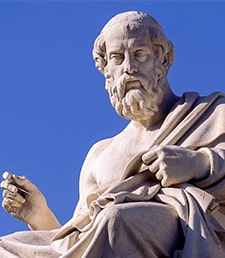Plato (427? BCE – 327? BCE) was a philosopher who was a student of Socrates and taught Aristotle. He is best known for his works on philosophy, which have had a profound impact on the development of philosophical ideologies till today.
Plato was a young man who was close to Socrates. He wrote a lot about ancient Greek philosophers, and what we know about Socrates’ character comes mostly from his work. Plato’s worked are similar to what Socrates did in the past and was deeply moved by the life and death of Socrates.
The activity of his teacher provided the starting point of Plato’s philosophizing. Plato was worried that if he became involved in politics, he would be treated unfairly like Socrates was. After the death of Socrates, Plato may have traveled extensively in Greece, Italy, and Egypt, though on such particulars the evidence is uncertain, most of what we know about his timeline and history comes from the popular work “The Republic.”
The Academy, which was founded by Plato in the 380s, was an important place where many talented men came to learn. It was very influential, and it helped many people to become successful. The great mathematicians Theaetetus and Eudoxus were famous for their work in mathematics. Plato was a thinker who used the results of other thinkers to help him in his own work. Aristotle was a member of the Academy for 20 years. After Plato died, Xenophon started his own school, the Lyceum, which was popular after Plato’s death because it was more accessible to people from all walks of life. Both these institutions served as the foundation of today’s educational schools and were the nourishing grounds for some of the greatest thinkers over a millennia.
Other eminent works by the philosopher include Plato’s dialogues, The Symposium and more philosophical excerpts on ethics and moral philosophy that were transmitted by Aristotle through his own writings. The years of his life and death still remain questionable, however, Plato’s contributions to philosophy have become a factual field of interest in the subject.


